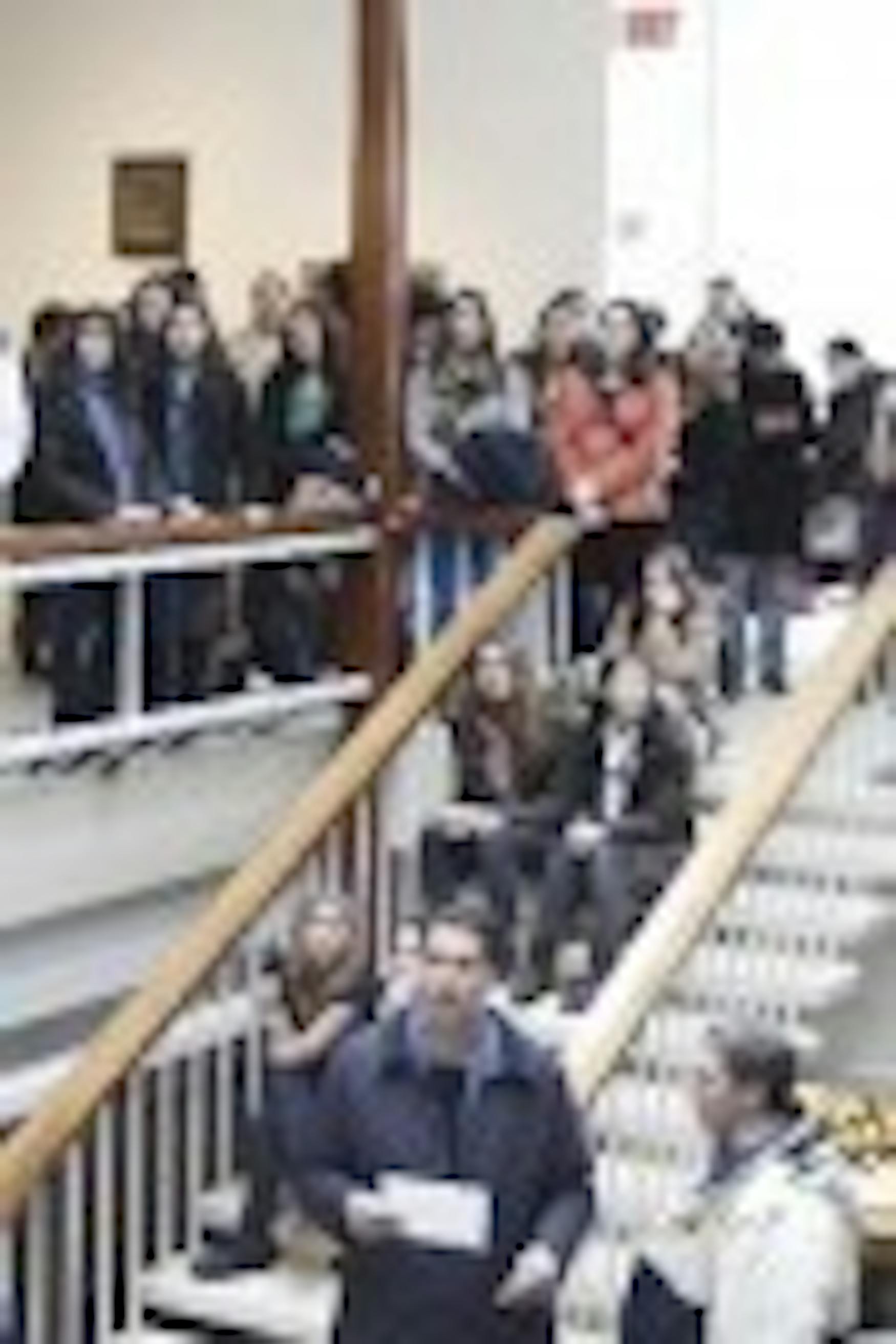Students protest against closure of Rose
Amid television cameras and reporters from newspapers like the Boston Globe, Rose Art Museum Director Michael Rush grabbed a microphone, hoping to give a speech at last Thursday's sit-in protest at the museum. But before he could begin, an eruption of thunderous applause filled the room, forcing Rush to pause until it died down before delivering his speech.The noise came from a crowd of 200 students, faculty, donors and Waltham community members who gathered last Thursday to protest the Board of Trustees' decision to close the Rose Art Museum. The event was organized by Rebeccah Ulm '11 and Maarit Ostrow '11 and was sponsored by the Brandeis Budget Cut Committee, a group created last semester to encourage student involvement in conversations about the University's budget cuts.
The Board of Trustees voted unanimously Jan. 26 to close the Rose Art Museum and sell pieces of its collection in order to "mobilize for the future and initiate a strategy to replenish our financial assets," according a Jan. 26 e-mail sent by University President Jehuda Reinharz.
Students congregated on the museum's upper level and the stairs leading to the lower level in order to listen to those who wished to speak about the closing. There was a table set up to the left of the microphone where attendees could sign a petition and help make posters to protest the decision, Ulm said. Several posters, such as ones that read, "Art is NOT a price tag!" and "UNWISE BRANDEIS," were eventually displayed on the museum's window.
Ulm explained that she wanted to do something to protest the decision as soon as she read Reinharz's e-mail announcing the decision.
"I read the e-mail Monday night, right before the Brandeis Budget Coalition Meeting. During the meeting, I was like, 'Hey, are we going to talk about this? Are we going to do something about this?'" Ulm said.
Ulm and Ostrow made opening remarks at the protest before Rush's speech. Ulm stressed the importance of the Rose to the Brandeis community and said that the presence of the Rose was a major reason that she and many other students studying art came to Brandeis. Ostrow spoke about how the decision to close the museum changes the University's spirit. "I feel they're changing the definition of what sort of school Brandeis is," Ostrow said in her speech.
Rush eventually took the microphone to say a few words. Calling the Rose a "jewel," Rush said the museum is "bigger than Brandeis" and that the University's decision to close the museum is "a big mistake with major historical ramifications."
"Students are demanding more transparency when huge decisions like this are made," Rush later said in an interview with the Justice. "That's the biggest thing students can do."
Office of the Arts Program Administrator Ingrid Schorr also spoke at the event. She stressed that the Office of the Arts was not in favor of closing the museum but said that the arts will remain important at Brandeis. "Maybe the fancy dining room is closing, but the kitchen is still open," she told the crowd.
"There are so many creative solutions that the student body and faculty could have come up with if they had only been asked," Ariella Silverstein-Tapp '09 said in an interview with the Justice. "I think there was a real lack of faith that the administration had in us," she said. "We go to Brandeis. We're creative. We're innovative," she added.
"We pride ourselves on being a liberal arts institution within this greater research university, and to get rid of something that has that symbolic presence seems to be changing the ideals of our University," Julia Sferlazzo '09 said in an interview with the Justice.
The open-microphone structure of the event was not limited to just students. Janet Shapiro, the president of the Artists West Association, an art studio in Waltham, also spoke, lamenting that "art is always the first to go" when a University needs to save money.
"What could be closer to home?" Shapiro said in an interview with the Justice when asked why she spoke at the protest. "This is in the very town my studio is in."
Ilana Zieff '10, who attended the protest, said she wrote a letter to Reinharz before the protest expressing displeasure with the decision.
"I think [Reinharz] is taking away creative thought," Zieff said in an interview with the Justice. "Without creating thought there is no furthering in sciences, in math, in politics [or] in writing, and by taking away this creative institution, [Reinharz] is killing the art department," she said.
"I'm really proud of how [the protest] turned out," Ulm said. "I'm incredibly inspired by the amount of people that showed up."
-Nashrah Rahman and Hannah Kirsch contributed reporting.



Please note All comments are eligible for publication in The Justice.